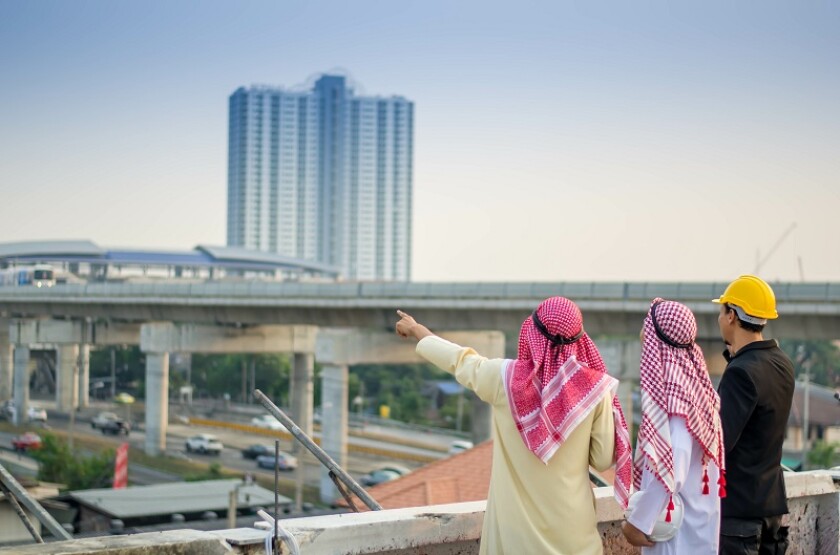Naryman Al Kassimi and Dana Halwani, Hatem Abbas Ghazzawi & Co
SECTION 1: Market overview
1.1 Please provide an overview of the project finance market in your jurisdiction.
In 2017, the project finance market was not as active as in previous years. However, in relation to water and co-generation projects, there are eight independent water projects or water and power projects planned to be developed in Saudi Arabia by 2025.
Typical project financing structures include equity in the form of equity bridge facilities, share capital and shareholder subordinated loans, senior debt from a number of institutions comprising commercial banks, commercial banks covered by ECA guarantees or insurance, Islamic banks, export credit agencies, the Public Investment Fund and the Saudi Industrial Development Fund (SIDF). There have also been two project bonds/sukuks and one issuance of a bond, the proceeds of which were indirectly used for project financing.
The General Authority for Civil Aviation (GACA) awarded three airport BTO projects in 2017 to a team comprising Turkey's TAV Airports and the local Al-Rajhi Group, as part of the drive to increase private sector participation in airports, for a passenger terminal building at Yanbu airport and the redevelopment of airports in Qassim and Hail. GACA also awarded a contract in 2017 to develop Taif International Airport on a BTO basis to a consortium comprising the local Asyad Group, Germany's Munich Airports and Lebanon's Consolidated Contractors Company.
1.2 What is the composition of the market in terms of the types of active lending institutions and has this been evolving?
In addition to commercial banks, the most active lending institutions within Saudi Arabia are the SIDF, Public Investment Fund, Saudi Agricultural Bank, Saudi Credit Bank, Islamic Development Fund and Islamic Corporation for Insurance of Investment and Export Credit. However, it is predicted that in 2018, the Public Investment Fund will spend $22 billion on new and existing projects which shall make it Saudi Arabia's most active project owner. In addition to the above government institutions, ECA's have also become more involved in project finance.
1.2 Please describe any major current projects or initiatives that are influencing activity.
The major initiatives that are influencing activity are Saudi Arabia's Vision 2030, the shift towards public-private partnerships, funding for the power generation and water desalination schemes transferred to the public sector, the National Renewable Energy Programme and the Saudi Electricity Company and Saline Water Conversion Company privatisation programmes.
In particular, Vision 2030, which contains a detailed agenda of socio-economic reforms to be attained by 2030, will increase the demand for project financing due to the large-scale infrastructure projects (which, inter alia, include hospitals and schools) to be created in connection therewith. Notable projects to be created include: the Red Sea project, which is a 34,000 km² tourism development that will include hotels and residences developed across 50 natural islands; the $5.3 billion Jabal Omar Development in Makkah, which will include hotels, retail, and residential properties; the Makkah Metro project; the 2,450 km² Al-Faisaliya project for the extension of the city of Makkah and the development of residential areas and entertainment, educational, health, agricultural and industrial facilities; the Neom city project, which will be an innovation hub with its own laws, taxes and regulations; and an entertainment city in Riyadh, which will focus on cultural, sports and entertainment offerings.
SECTION 2: Transaction structures
2.1 Please review some recent notable transactions involving your market and outline any interesting aspects in their structures.
In the only project financing during 2017, we advised the lenders to the successful bidder for the 1,504 MW Fadhili independent power project, which is being developed by a project company led by Engie and will produce 1,477 tons per hour of steam and 768.8 tons per hour of feed water. Saudi Electricity Company will be the offtaker for the electricity and Saudi Arabian Oil Company shall be the offtaker for the steam and water. We also advised Acwa Power in connection with the $814 million bond with a 22-year maturity, which is secured by cash flows and other securities from eight operating power generation and/or desalination plants in Saudi Arabia. Even though this was not a project finance transaction per se, it was a project related bond raising money for a company involved in project financing. Financial close also occurred in 2017 for the 250,000 cm/d Shuaibah 3 independent water project expansion.
2.2 What might the projects above mean for the market and have you noted other noteworthy developments in the way project finance transactions are being structured for a) energy projects and b) infrastructure development?
The above projects demonstrate that even though the project market stalled in 2017, companies raised finance through bond issuance, re-financings and ECA financing. However, it is expected that privatisation shall move forward in 2018 and that the implementation of Vision 2030 will mean that project financing will be an extremely active sector for the next 12 to 13 years.
SECTION 3: Legislation and policy
3.1 Describe the key legislation and regulatory bodies that govern project financing in your jurisdiction.
The government is currently restructuring several sectors under Vision 2030 in relation to policy and legislation so as to be on the same level as for the power sector, for which the legislation is set out in the paragraph below to ensure that such sectors (such as transportation, hospitals and schools) have the same policy and legislation as the power sector.
The key legislation is: the Foreign Investment Regulation, Royal Decree M/1 dated April 10 2000; Electricity Regulation, Royal Decree M/56 dated November 22 2005; Electricity Regulation Implementing Rules, issued pursuant to Electricity and Co-generation Regulatory Authority Board Resolution 3/11/27 dated May 13 2006; and the General Environmental Regulation, Royal Decree M/34 dated October 15 2001.
The key regulators are the Saudi Arabian General Investment Authority, the Ministry of Commerce and Investment, the Ministry of Energy, Industry and Mineral Resources (which oversees the electricity sector), the Ministry of Environment, Water and Agriculture (which oversees the water desalination sector) and the Electricity and Co-generation Regulatory Authority.
3.2 Have there been any recent changes to regulations or regulators that may impact the finance structuring in terms of guarantee and security regimes, local currency rules and foreign investment restrictions?
The Saudi Arabian Monetary Agency (SAMA) has recently issued a circular dated May 22 2017, which provides that the previous method by which banks could take mortgages over real estate – whereby the ownership of the real estate would be transferred to the bank or its subsidiary by means of a pledge of the title deed (this mechanism was adopted to circumvent the refusal of Notaries Public to register land mortgages in favour of banks) – is no longer permitted. According to this circular, such mortgages in favour of banks can now be registered with the Notaries Public.
3.3 Please describe the regime governing renewable energy investment.
The National Renewable Energy Programme, which is overseen by the Renewable Energy Project Development Office under the authority of the Ministry of Energy, Industry and Mineral Resources, sets out a target for 3.45GW of renewable energy to be developed by 2020 under the National Transformation Plan, and for 9.5GW of renewable energy capacity to be established by 2023. The National Renewable Energy Programme will be phased and rolled out in a systematic and transparent way to ensure Saudi Arabia benefits from cost competitive nature of renewable energy.
The Wind 400 MW IPP and Sakaka PV 300 MW Solar APP projects are due for award in 2018. Both projects will be 100% private independent power projects (IPPs) which will be backed by 20-year and 25-year power purchase agreements (PPAs) respectively.
The King Abdullah City for Atomic and Renewable Energy (KA-Care) oversees Saudi Arabia's planned nuclear power programme, pursuant to its internal financial and administrative regulations. KA-Care has launched the Saudi National Atomic Energy Project that will include establishing a legislative and regulatory framework for atomic energy.
3.4 Does your jurisdiction have incentive schemes in place for various types of energy or infrastructure project development?
For the energy sector, the government provides an incentive to companies by making available land to lease at low rates at the Royal Commission for Jubail and Yanbu and the Saudi Industrial Property Authority. Also, interest free loans are provided to industrial companies by the SIDF after meeting SIDF requirements.
The Government Procurement and Purchases Regulation provides that priority is given to Saudi products and services when awarding government contracts.
It is anticipated that there will be some incentives once infrastructure policy and legislation is finalised.
3.5 Are there any rules, legislation or policy frameworks under discussion that may impact project finance in your jurisdiction?
There are discussions in place regarding the issuance of the following updated regulations:
1- the Bankruptcy Regulation;
2- the Commercial Mortgages Regulation; and
3- the Privatisation Regulation.
SECTION 4: Market idiosyncrasies
4.1 Please describe any common mistakes or misconceptions that exist about the project finance market in your jurisdiction.
A misconception that exists is that interest is not enforceable in our jurisdiction; however, there are methods to ensure it is enforceable. Another common mistake seen in project finance transactions in our jurisdiction is the purported creation of a pledge over shares in a Saudi limited liability company, as part of the onshore security package in a project financing.
4.2 What measures should be taken to best prepare for your market idiosyncrasies?
Investors can prepare for market idiosyncrasies by having experienced legal, financial and accounting advisors who can advise on tried and tested methods to ensure interest is effectively enforced. Unenforceability of share pledges in a limited liability company can be overcome with a share pledge in a joint stock company. Lenders can also ensure other adequate security is granted over the borrower's bank accounts, receivables, plant, equipment and insurance proceeds.
SECTION 5: Practical considerations
5.1 How established is the legislative framework and authorities that govern public-private partnerships (PPP) and where have PPP structures most successfully been applied?
Currently, there is no PPP regulatory framework but the government does evaluate PPP projects with other government investment priorities in an unregulated framework while the government establishes the National Project Management Office. The legislation most relevant to PPPs is the Government Procurement and Purchases Regulation. Furthermore, there are a number of government bodies relevant to the regulation of PPPs:
1- the Renewable Energy Project Development Office;
2- the National Project Management Office; and
3- the Privatisation Office/Department.
Our understanding is that the Privatisation Office is in the process of preparing a Privatisation Regulation.
5.2 What are the key considerations relating to foreign investment into projects as regards insurance and tax structures?
The Control of Cooperative Insurance Companies Regulation of 2003 restricts insurance activities in Saudi Arabia to Saudi-registered companies which are incorporated by Royal Decree as public joint stock companies, with a minimum paid-up capital of SR100 million ($27 million) for primary insurers, and SR200 million for reinsurers. To date, 35 insurance and reinsurance companies have been licensed and incorporated.
Insurers must be licensed by SAMA to write specific classes of business, which are broadly grouped as general insurance (including accident, liability, motor, property, marine, aviation, energy and engineering), health insurance, and saving and life insurance, or for two or more of these, depending on the proposals put forward by the applicant in the feasibility study and business plan which must be submitted with the licence application. Once a company is duly licensed, the offering of any products in the market must be pre-approved by SAMA. Therefore, any insurance obtained by foreign investors in Saudi Arabia must be obtained from SAMA approved insurers.
Licensed foreign investors in Saudi Arabia generally enjoy all privileges and incentives extended to wholly Saudi owned companies including privileges granted by double tax treaties to which Saudi Arabia is a party or the right to repatriate profits.
Wholly owned Saudi companies pay a religious tax (Zakat), which is 2.5% of its net worth, while foreign investors are taxed at a flat rate of 20% of profits.
Payments to a non-resident with no permanent establishment in Saudi Arabia for any amount realised from a source in the Kingdom are subject to withholding tax. Interest or loan charges paid to non-resident entities are subject to five percent withholding tax unless applicable to a double tax treaty. No stamp duty is payable but as of January 1 2018, VAT applies with respect to a broad range of products and services with very little exemptions and zero rating.
5.3 Are there any specific issues creditors should be mindful of regarding a bankruptcy and restructuring scenario?
The rights of creditors in a bankruptcy and restructuring scenario are covered by the Commercial Court Law enacted by Royal Decree M/32 dated 15/1/1350 Hijra (corresponding to June 2 1931 Gregorian) (the CCL), which to the extent that it deals with bankruptcy, codifies Islamic law principles and the Companies Regulation, Royal Decree M/3 dated 28/1/1437H. The CCL provides that rent for the bankrupt's residence and business premises, wages of the bankrupt's servants and clerks and the dowry of the bankrupt's wife shall take priority over all other debts. There are certain other preferential debts, such as employees' wages, social insurance contributions, certain customs duties and the expenses of the bankruptcy. Secured debts are to be fulfilled out of the sale proceeds of the secured assets and any surplus after the sale should be added to the bankrupt's estate.
Due to the fact that the CCL was enacted in 1931 and contemplates personal as opposed to corporate insolvency, the Ministry of Commerce and Investment has published a draft new bankruptcy regulation on its website for public consultation and comment but it is not known when this shall be enacted.
SECTION 6: Outlook
6.1 What are your predictions for the next 12 months in the project development and financing sector and how do you expect legal practice to respond?
It is our view that the next 12 months will see an increase in projects being funded on a PPP basis, particularly with respect to co-generation, water and renewable energy. Further progress shall be made with the privatisation of Saudi Electricity Company and Saline Water Conversion Company and the unbundling of assets which shall mean future plants shall be developed on a PPP basis. We also expect to see an emerging renewable energy sector with the Wind IPP and Sakaka PV Solar APP projects due for award in 2018. A consortium that was awarded a contract to develop Taif International Airport on a BTO basis is expected to reach financial close in 2018. There are also plans to privatise the Saudi Grains Organisation, a state-controlled grain silos and flour mills operator. As part of the privatisation of the sewage treatment sector, the Water and Electricity Company is also planning to develop sewage treatment plants under a PPP model. On January 17 2018, the National Education Initiative commenced its PPP project for schools.
The Public Investment Fund is expected to be the most active project owner with spending of $22 billion on new and existing projects. The government policy of public consultation will mean that the legal practice will play a key role in the formulation, interpretation and implementation of the PPP and renewable energy legislative and regulatory framework.
About the author |
||

|
|
Naryman Al Kassimi Senior associate, Hatem Abbas Ghazzawi & Co Riyadh, Kingdom of Saudi Arabia T: +966 11 273 4920 F: +966 11 416 9735 E: naryman.alkassimi@saudilegal.com Naryman Al Kassimi is a senior associate in the Riyadh office of Hatem Abbas Ghazzawi & Co – Saudilegal. She works in the project finance, banking and finance, corporate law and commercial law practice areas. Al Kassimi received a bachelor's degree in law and a master of law from the University of Southampton in the UK. |
About the author |
||

|
|
Dana Halwani Associate, Hatem Abbas Ghazzawi & Co Jeddah, Kingdom of Saudi Arabia T: +966 12 650 4475 F: +966 12 657 2007 E: dana.halwani@saudilegal.com Dana Halwani is an associate in the Jeddah office of Hatem Abbas Ghazzawi & Co – Saudilegal. She works in the project finance, banking and finance, capital markets and corporate law practice areas. Halwani received a bachelor's degree in law from King Abdulaziz University in Jeddah, Saudi Arabia and a master of law from New York University School of Law in the US. |
